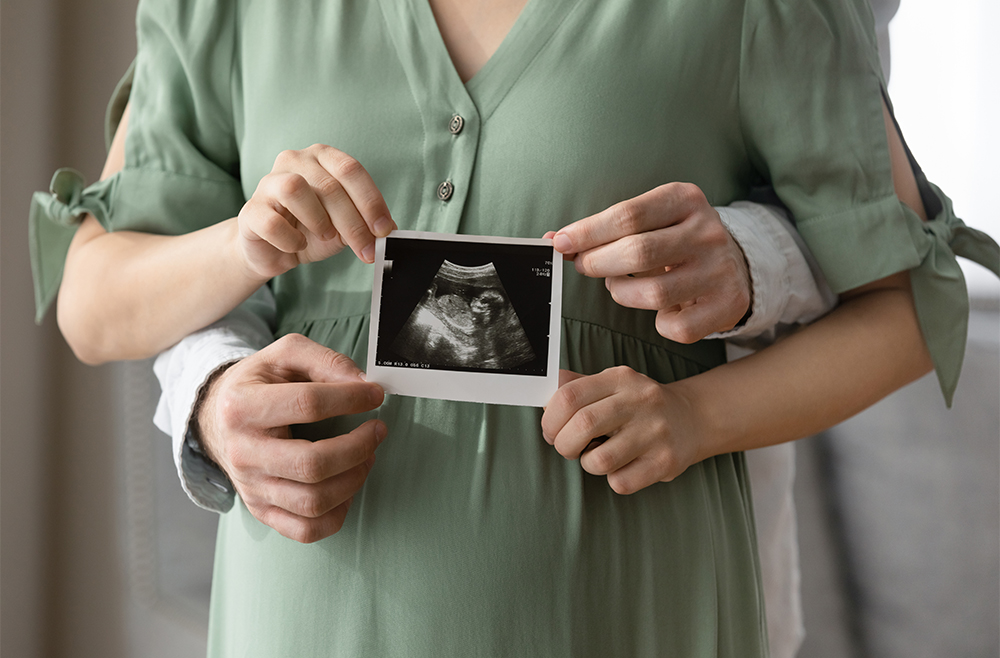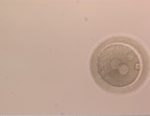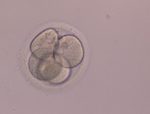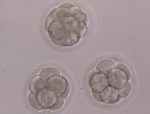In – Vitro Fertilisation (IVF)
In – Vitro Fertilisation (IVF)

Infertility treatment in which an egg being surgically removed from the ovary and fertilised outside the body.
Depending on the quality of the semen, the fertilization is done either with the conventional IVF method or with the help of an Intra Cytoplasmic Sperm Injection (ICSI).




Who might benefit?
- Female with damaged or blocked fallopian tubes, or structural defects (congenital abnormalities) of the
uterus - When ovaries do not respond to infertility medications
- For females with Lutenised unruptured follicles
- Immunological factors
- The woman has significant endometriosis leading to infertility
- The infertility is “unexplained”
IVF Procedure
Development of the ovarian follicle
- Although most women usually develop a single egg per month, most Reproductive Endocrinologists (RE) want to maximize the number of eggs retrieved in an IVF cycle
- To do this the Intended Mother or Egg Donor will take medication (Gonadotropin Injections) to produce several follicles at one time
- When the follicles reach maturity the patient will receive an injection of hCG (Human Chronic Gonadotrophin) usually late at night or early morning (Approximately 34-36 hrs prior to Egg retrieval)
- This will be the start of the final phase of the egg development
Egg Retrieval
- Most egg retrievals from the ovaries are completed between 34 and 36 hours after the hCG injection. The timing is extremely important here for the RE to retrieve maximum number of oocytes from the stimulated follicles
- The triggering injection is hCG-hormone, and it matures the eggs, releasing them to the follicular fluid
- The egg retrieval procedure uses the same vaginal ultrasound probe that was used for follicle monitoring. The follicle is entered and follicular fluid removed with gentle suction
- An aspiration needle is attached to the probe and inserted up through the vagina and into the follicles of the ovary
- The egg retrieval procedure is done under anaesthesia. The egg collection may take 10-20 minutes, depending on the number of follicles
Semen Collection
- The IVF clinic will recommend that the Intended Father or Sperm Donor should not ejaculate for at least two days prior the egg retrieval
- To maintain potency, the semen specimen needs to be delivered immediately prior to the egg retrieval at the clinic where special semen collection room is provided
- Alternately the semen can be collected at home and brought to the clinic within a certain specified time frame (within 1 hr. of semen collection)
- The clinic will give the patient the proper guidelines for semen collection
What happens in the IVF Lab
- During the egg retrieval, tubes containing follicular fluid are taken into the lab & are simultaneously scanned for the oocytes. This procedure is called as Oocyte Scanning or Oocyte Hunting
- The oocytes are placed into a petri dish containing a culture medium in the form of droplets. The dish is then placed for an hour in an incubator that mimics the conditions of the human body (temperature etc.)
- Each droplet contains single oocyte & is inseminated with the washed sperms, for fertilization to occur. This day is considered as Day Zero of the IVF procedure
- The next day, is Day 1, when oocytes are checked for fertilisation. If oocyte has fertilised we can observe 2 pronuclei at the centre of the cytoplasm with the 2 polar bodies in the PVS of the oocyte. At this stage it is called as ‘Embryo’
- On Day 2, embryos are checked for cellular development. On this day embryo should be at least 4 celled
- The embryos are monitored daily. If the fertilization and growth are normal (embryo with 6-8 cells), the embryo transfer can be completed within three to five days
The embryo transfer
- Embryo transfer simply delivers the embryos into the uterus. There is no need for sedation or anesthesia
- A speculum is placed into the vagina. The embryos (usually not more than 3) are loaded into the catheter along with a small amount of fluid, and then catheter is introduced into the uterus through the cervix and the embryos are transferred into the endometrial cavity
- After the procedure, the patient is advised to rest in bed for 2 hours, with her head down slightly and feet up
- After going home, she will need to rest in bed for the rest of the day. On the next day she can resume non-strenuous activity. Please note that each clinic has their own protocol and will advise the patient to follow their specified directions
After transfer care
- Generally, on the day of the egg retrieval, the patient will be told to start progesterone. This medication can come in many forms including injections and vaginal suppositories
- On or about fourteen days after the embryo transfer a blood pregnancy test (hCG) is ordered to see if indeed the transfer has worked and there is a pregnancy
- If the test is positive, an ultrasound will be performed two weeks later to confirm the pregnancy. If everything goes as planned then at about 10 weeks the patient will be released to her obstetrician
Success Rates
One of the main factors influencing the outcome of IVF treatment is the age of the female whose eggs are used, as the quality of the eggs decline as the woman gets older. The rate of birth defects, chromosome abnormalities and miscarriages also rises with maternal age
The procedure has an average success rate of 30-35%. This rate is affected by the Woman’s Age at the time of treatment and upon your particular fertility problem
To avail of our IVF program at reasonable IVF cost Mumbai kindly write to us at reachus@corionfertilityclinic.com
Advantages
- While some assisted conception procedures are still relatively new, IVF has been around long enough for researchers to do extended health studies on the children conceived using this method. In the majority of cases there are no long-term problems for children conceived by IVF
- Gives women with blocked, damaged or missing fallopian tubes (the normal route for the egg to travel from the ovary to the uterus) a chance to have a baby
Disadvantages
- Since the procedure often places more than one embryo in a woman’s uterus, there is higher chance multiple pregnancies
- Multiple pregnancies increase risk of miscarriage and other complications
- The fertility drugs used to stimulate egg production themselves can have severe side effects. You will need to be closely monitored while you are taking them to ensure you do not develop Ovarian Hyperstimulation Syndrome (OHSS)
- Any treatments that use drugs to stimulate the ovaries can lead to an increased risk of ovarian cancer in later life
FAQS
IVF Procedure in India, takes about three to four weeks to complete one cycle of IVF.
Post IVF Procedure in India – embryo transfer strict bed rest is not compulsory. Patient need to take things easy by avoiding strenuous activities , heavy weight lifting , physical and mental exertion.
The success of one IVF cycle is 35 – 40 % , and when we do 3 consecutive IVF cycles the cumulative success rate is 60 – 70 %. Some patients may complete their family in one IVF cycle while some may require more attempts.
During IVF Procedure Avoid smoking , binge alcohol drinking , strenuous activities.
The IVF procedure cost in India varies from Rs 1,30,000 to upwards of 2,00,000.
The success rate of one IVF cycle is 35 – 40%. And the cumulative success rate of 3 consecutive IVF cycles is 60 – 70%.
Copyright © 2024, Corion. All Rights Reserved.
Website is designed & developed by Phi Brands


